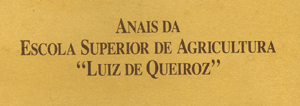This research aims to elucidate some doubts concerning the determination of the "T" value (total capacity of exchangeable base), the "S" value (exchangeable bases) and the "H" value (exchangeable hydrogen) in soils receiving heavy amounts of vinasse (waste product obtained in distilleries after the alcohol has been distilled off). In fact, it is known that in this case the values of "S" are sometimes larger than the corresponding values of "T", which is clearly absurd. Vinasse was applied to equal amounts of soil kept in iron pots. Four replications of the folowing treatments were obtained: 1st treatment: Control; 2nd treatment: Equivalent to 250.000 liters of vinasse per hectare; 3rd treatment: Equivalent to 500.000 liters of vinasse per hectare; 4th treatment: Equivalent to 750.000 liters of vinasse per hectare; 5th treatment: Equivalent to 1.000.000 liters of vinasse per hectare; Four samples were obtained from each of the 20 pots; after the soil was dried up in the shade "T", "S" and "H" were determined in each sample, by research methods including leaching with normal solution of amonium acetate, amonium chloride and barium chloride. Soluble salts and pH were determined also, and the possibility of loss of NH3 when washing the soil with alcohol was checked up and recognized to be non-existent. The data thus obtained were submitted to statistical analysis, which showed that indeed the values of "T", "S" and pH do augment with increasing amounts of vinasse, while "H" decreases. The authors concluded also that the methods using amonium saturation (either with amonium acetate or amonium chloride) should not be used for soils receiving large amounts of vinasse, since the peptization and solubilization of abundant organic matter leads then to underestimation of the value of "T". This underestimation is so serious that sometimes the value of "T" obtained is less than the corresponding value of "S" Therefore, bivalents cathions like calcium and barium are recommended for this case, notwithstanding their defects.
